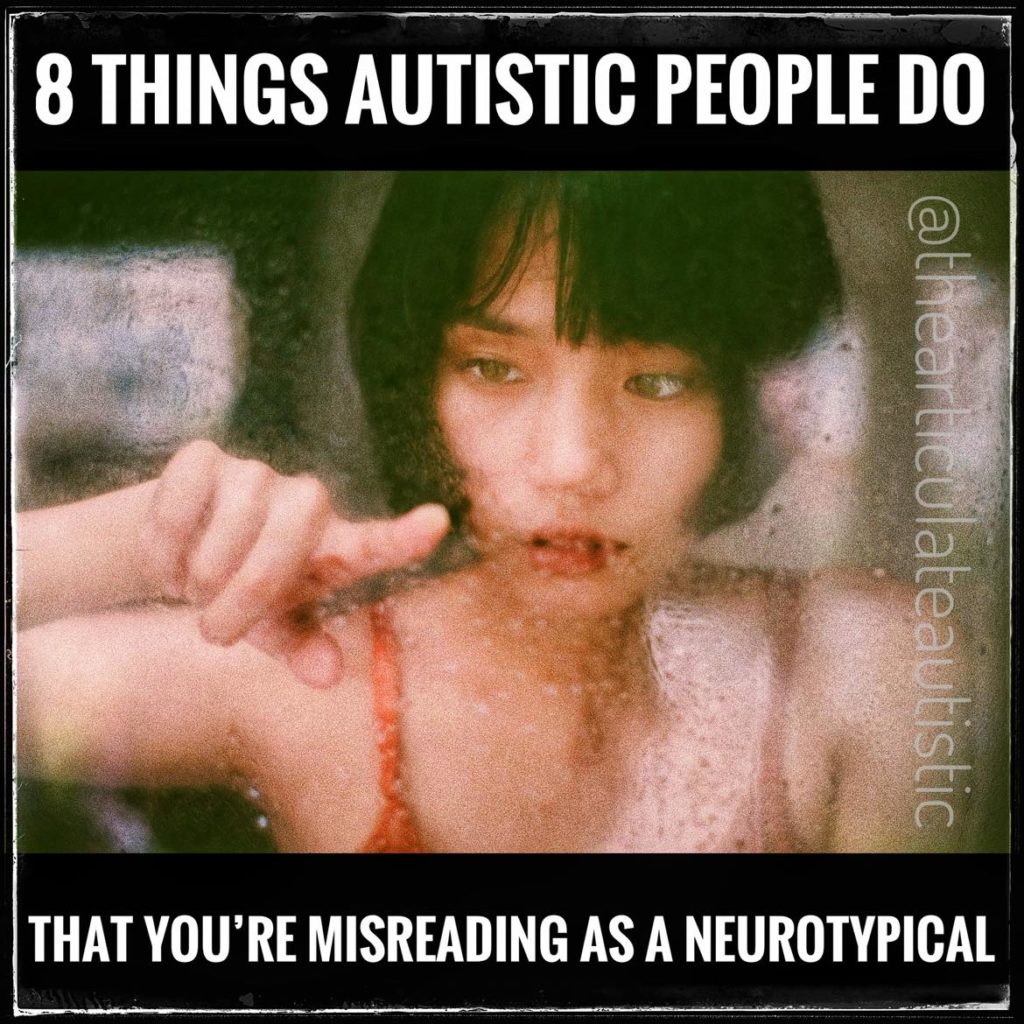8 Things Autistic People Do That You’re Misreading as a Neurotypical

If you have an autistic loved one, it’s important to understand how they interpret and interact with the world to avoid traumatic misunderstandings and unintentional gaslighting.
Here are 8 things that autistic people do naturally that you may be misreading as a neurotypical person:
- Sighing

For most neurotypical people, sighing and yawning are signs of tiredness and/or boredom. For autistic and otherwise neurodivergent people, however, frequent yawning and sighing can be used as emotional regulation tools (especially when it comes to managing sensory overload).
I’m someone who yawns and sighs very frequently, and, since I don’t use it as a social cue to indicate boredom, I’m usually not even aware of it or the effect it can have on others around me.
It took me until adulthood to realize that yawning and/or sighing was used as a social indicator of ANYTHING, let alone an indirect way to say I was uninterested in what someone was saying to me!
Being told off and asked, “Am I boring you or something?” was VERY confusing for me because I hadn’t even realized I was yawning, so I just thought people were randomly asking the question angrily, and it scared me and made me think that neurotypical people were, by and large, emotionally volatile!
It’s the same thing with sighing. I sigh all the time. I didn’t even realize I was doing it when I was a kid or a teenager, so when somebody would suddenly interrupt me and get in my face and ask, “What’s wrong with you?” it just confused and startled me.
Nobody said, “You’re yawning. That usually means you’re bored. Are you bored?” or “You’re sighing a lot. Sighing usually means something is wrong or you’re giving a subtle signal you want to talk about something. Is that the case?”
Another thing that really messed with me is someone I was friends with as a teen thought I was trying to TURN HER ON by sighing around her all the time. I kid you not, and that traumatized me because my natural autistic traits had been sexualized in my past when I had no intention of drawing that kind of attention.
- Throat Clearing

Frequent throat clearing is often lumped into the “stim” category, and while it can be, that’s not always the case. There’s evidence to suggest that autistic people have more frequent sinus problems as a result of altered digestion. This means, there’s a literal wad of phlegm in the throat that needs to be cleared out so the person doesn’t choke on it.
This definitely describes me. I have chronic post-nasal drip that has been with me since birth. I have year-round allergies, and my nose runs every time I eat. I’ve tried every prescription, over-the-counter, and natural remedy I can get my hands on, and I still suffer. Weirdly, I’ve mostly gotten used to it and don’t even notice it that much until I meet someone new, and they point it out.
Unfortunately, when I was a kid, my throat clearing was seen as yet another thing I did “for attention” or as a “nervous habit”. Nope. I have wads of phlegm stuck in the back of my throat, and if I don’t clear it frequently, I choke.
There’s no hidden social meaning behind it. I’m just trying to stay alive.
- Stimming

These days, there’s a lot more information on stimming and the importance of it for autistic people than there was when I was a kid. However, there are still many neurotypical people who aren’t aware of its function and give these traits hidden social meaning when there is none.
Humming, flapping, rocking, swaying, tapping, and fidgeting are just some examples of stims that are common and natural to autistic people that can sometimes be misinterpreted.
Stimming can be misperceived as rudeness, inattentiveness, boredom, disinterest, and disrespect–just to name a few things.
When these behaviors are misinterpreted so drastically, it can cause trauma for the autistic person who doesn’t understand why the neurotypical people around them are “suddenly” angry.
When a neurotypical person lashes out at their autistic loved one for stimming, the autistic person doesn’t learn to stop stimming (because they are not connecting your reaction to their natural, unconscious behavior), they learn to be afraid of you because, in their eyes, you’re an unpredictable and frightening person!
Jaime A. Heidel – The Articulate Autistic
The best thing you can do when your autistic loved one stims during everyday interactions? Ignore it. If they don’t seem like they are in distress, and these are common behaviors for them, don’t point them out or make a big deal about them. Just continue the interaction!
- Asking Questions

Autistic people need to ask lots of questions in order to understand what’s expected of them or to learn a new task. When we ask questions, we are looking for answers, nothing more, nothing less.
It took me until my thirties to realize that some neurotypical people ask questions as a passive-aggressive attempt to undermine someone else’s authority!
(What??)
When a neurotypical person misunderstands their autistic loved one’s intentions when asking questions, it can cause the autistic person to develop learning trauma. We become terrified to ask questions because people become angered by them (which only makes those of us with learning differences fall even further behind).
- Taking Things Literally

Autistic people take things literally, and this is another common source of misunderstandings between the neurotypes. We’re not being “purposefully obtuse” or being a “smart-ass”. It’s just the way our brains are wired.
The neurotypical person says something they think is funny, or they use an idiom the autistic person isn’t familiar with, and a misunderstanding ensues.
The neurotypical person thinks the autistic person is being sarcastic, and the autistic person thinks the neurotypical person is getting angry for no discernable reason.
It’s frustrating for you and frightening for us.
- Speaking Formally

Autistic people are often accused of being rude or “above it all” because of the way we speak. When I was a kid, I was told I was condescending all the time, and I had no idea what anyone was talking about!
I couldn’t hear the difference in my tone or manner of speech in comparison to other kids, so when someone mocked me by imitating my speech back to me, I thought they were starting with me. I didn’t learn anything from their behavior other than to be wary of others and avoid them.
I actually didn’t realize how monotone and formal I sounded until I started recording myself. I was amazed because that’s not how my voice or intonations sound to my naked ears!
- Looking Away

For many autistic people, direct eye contact is painful. For me, it feels like I’ve skipped a step going downstairs. It makes my stomach lurch, and I feel a bit light-headed.
So, looking away when talking to someone is totally natural to me. It makes me feel safe and comfortable, and it greatly increases the likelihood that I’ll both remember what I intend to say and be able to pay attention to what the other person is saying to me.
If your autistic loved one is looking away from you, your first thoughts may be that they have something to hide or they’re uninterested in what you have to say.
Neither is true. Direct eye contact is uncomfortable for us, so we look away. There’s no hidden social meaning behind it.
- “Guilty” Gestures

There are many natural autistic traits that neurotypical society views as “guilty” gestures. Fidgeting, tense shoulders, wringing hands, darting eyes, and atypical breathing patterns (frequent yawning and sighing, for example) are often signs of anxiety, which autistic people feel at least an undercurrent of all the time because we live in a world not built for us.
I used to be accused of “hiding something” all the time when I was a kid, and I had no idea what anyone was talking about. I was just told, “You look guilty all the time”, but nobody explained what it was that I was doing that made them feel that way, so I spent most of my time perplexed and hypervigilant.
The Takeaway
These common misunderstandings between the neurotypes, when added up over a lifetime, can cause complex post-traumatic stress disorder, which I have. I write about what I’ve experienced so your autistic loved ones don’t end up with it, too.
The more you understand about the autistic brain and how we function in the world, the better a parent and/or ally you will be!
Sources:
https://bmcpediatr.biomedcentral.com/articles/10.1186/s12887-019-1841-8



As someone who wasn’t diagnosed as autistic until I was in my late 50’s — oh, how I can relate to all of these!
> some neurotypical people ask questions as a passive-aggressive attempt to undermine someone else’s authority!
And I can add a related scenario. A neurotypical authority figure gives an autistic person an assignment. The autistic person doesn’t understand what to do, but out of fear of the consequences of asking questions proceeds anyway and unintentionally gets it wrong. Then the neurotypical angrily accuses the autistic person of deliberately sabotaging the assignment as a display of contempt for the neurotypical’s authority!
Yes, this!
Thank you so much for this article! I’m 16 years old, and I’ve wondered if I might be autistic for the last few months, and having read this, I’m definitely thinking I am. For example, if I’m sitting in a swivel chair, it’s really, *really* hard for me to not spin in it. It has been since, well, as long as I can remember. I’ve tried to stop the whole time, but it’s just been the last couple years that I’ve actually been able to stop… unless I’m the only person in the room, in which case I often still can’t help it. Does that sound like a stim? I also do things like tapping on things randomly. I didn’t even realize that I’m tapping with my feet right now, until I typed this.
I also sigh, yawn, and clear my throat a lot. Eye contact is definitely awkward for me.
I never knew that some neurotypical people used questions to undermine other people’s authority either until I read this post. That does explain why some people don’t like the fact that I ask a lot of questions.
I also do “guilty” gestures a lot.
I get really distracted and upset if someone asks me if I’m okay while I’m driving. Does that likely have something to do with autism?
While I’m in no way a professional diagnostician, you definitely sound like you have many autistic traits. Are your parents open to getting you an evaluation? If so, I would definitely recommend it.
Unfortunately I don’t think that’s an option. I did just take a RAADSR test, and I got a 151. I’m pretty sure I’m autistic, even without a diagnosis.
*RAADS-R
Yes! But when I got up the courage to ask questions they bit my head off. Now I avoid them.
Being diagnosed with ASD (and also ADHD-PI), and having also happened to have worked the same job for many different bosses from a wide variety of nationalities and cultural backgrounds, I find this effect is very noticeably dependent on the particular acculturation of the neurotypical person taking offence at most of my traits, but especially my asking for clarification.
Specifically, I have observed that supervisors hailing from cultures that were both “low-context” and “low-machismo” tended to best understand how to instruct and motivate me, and were generally more willing and able to tolerate my horizontal communicative style, particularly my need to eliminate any ambiguity whatsoever in instructions given (in the presence of ambiguous communication, I will frequently end up with the wrong interpretation if I don’t seek clarification; much more frequently than mere random chance should allow), and figure out and provide me with the environment I needed to be an effective employee.
Supervisors from cultures at the other end of one or especially both of these cultural axes, on the other hand, tended to rapidly come to despise me, made my working life an anxious hell of eternally walking on eggshells, and ultimately had me constructively dismissed from a job I loved. I’ve been unemployable and struggling to recover from massive trauma ever since.
I hear you! This happened to me too Tom!
hi. this article hit like a lead weight from the sky. had no idea that the cptsd was probably from autism. apparently a lot of people assumed i was diagnosed or knew i was autistic. had a really big cry on the couch with my partner. still sitting with this. going to be bringing it up with therapist.
but suddenly my whole life makes sense. and it feels freeing somehow. so thank you for that.
You’re welcome. I’m so glad things are making more sense to you now. 🙂
I’m glad I found this website! I was diagnosed with a learning disability only when I was near to completing my Associate. But I didn’t know I was neurodivergent until I was tutoring a number of my students who are ASD and/or other learning disabilities, and they kept telling me how understanding I was, they felt safe with, or helped them understand concepts for the first time that they struggled with, etc. A few whom I was close to even asked if I was undiagnosed ASD. After combing Autism/Neurodivergent resources did I realize that a multitude of learning disabilities put someone under Neurodivergency. I’ve bookmarked this!
I’m so glad you found out about your own neurodivergence. It helps tremendously, doesn’t it?
What a clear and helpful post! Autism isn’t a stranger to our clan… We have a grandson who is content to spin ribbons and ropes for an hour at a time… and a granddaughter (in a different family) who stims with both hands rather frequently.
It’s very important that families understand the significance of these behaviors. I wish everyone could read this concise, well-written post!
Thank you so much!
I worked for 17 years at a very difficult place, for me. Understanding my autism and how it literally ruined my life, it is good to read these words. I know know how my sarcasm affected some people and what that lead to. I am also bipolar II so that does not help. Thanks for sharing this information.
This is a very timely article for me! Last week, I was at my local social club, when a couple came in and sat between me and another group. I felt crowded in and uncomfortable, so felt the urgent need to move. One of the group accoused me of being rude, but I tried to explain that I was just trying to make more room for everyone (for getting out and about, getting drinks, etc…). It was only when I moved to more convenient (for me) table, that I realised that it could wel have been an aspect of my autism (aversion to crowds), but realised it may have been pointless to explain this to the group that I was autistic – even if I could had proved every point in my argument, they may not have believed me! Incidentally, is it possible to have a pdf copy of this article? If may be useful in helping me should a similar incident occur in the futureQ
Hey, Alan. I’m glad the article helped you! You’re right, sometimes explaining things to NT people just makes them disbelieve you even more. Never quite understood that one. I do have PDF versions of my articles available on my Patreon. Here’s the link: https://www.patreon.com/thearticulateautistic
High functioning autism makes people hate me.
The other guys where I live, who are more autistic than me, get treated like a baby or a pet, especially by NT women.
I can’t stand it.
Ugh! I’m sorry. 🙁
What the world 1,2,4? The first on the list is apparently there are people who never worked the nightshift or never had a sleeping. On number 2 why are people acting like viruses and allergies don’t exist? Number 4 some people actually need help with understanding some things and we don’t want under mind your authority. Why are they acting that aren’t people who don’t actually need help? They are just to going fuss when we do some wrong and we didn’t do the task right.? Isn’t number 4 consider ablesim?
There are logical reasons for 1,2,4 and they are not always rude. Number one on the list the person could have been working the night or had insomnia. Number 2 on the list why are people acting like allergies and virus don’t exist? Number 4 on the list is discrimination and sometimes people actually need help
I’m nearly in my 50’s and my daughter was recently diagnosed at the age of 11, through her diagnosis it’s become pretty evidenct I too am autistic, the pieces of my lifes jigsaw literally started to fall into place when that empyphany hit home! 😉 I’m currently awaiting my “formal” assessment and diagnosis, but the above article describes/paints a picture of my life up to now that is pretty spot on, I just didnt know why I was the way I was! I tactually thought (for a long time) I was `damaged` in some way mentally, a sociopath or worse, I was so different and awkward 🙁 it was such a relief to realise it was just what MY normal looks like.
It’s great to see these insights into the unique ways autistic individuals communicate and navigate the world. This helps build better understanding and appreciation for their perspective. Thanks for shedding light on this important topic!
Is it common for someone to read this as a NT person but be able to relate to most of these traits? I’ve always wondered if I had something like ADD because my capacity to keep engaged in tasks or conversations has been very low since I can remember. But if there is something I seem to enjoy, it’s very hard for me to stop and put it down. As a child I used to have a twitch with my eyes and hands which my family made fun of me for and I became so paranoid about doing it that I resorted to biting the inside of my cheek which I still do today. I know someone who was diagnosed with autism as an adult, and I also have a sister-in-law who is severely autistic so this is great to be able to understand more.
If these traits resonate with you, you may be neurodivergent; autistic or ADHD or both. I’d recommend looking into it further. Follow the #actuallyautistic hashtag on Instagram and TikTok, and see if more traits seem to apply to you.
Wow, superb blog layout! How long have you ever been running a blog for?
you make running a blog glance easy. The full glance of your website is great, let alone the content material!
You can see similar: ecommerce and
here sklep online
Hi, I do believe this is a great site. I stumbledupon it 😉 I am going to return yet
again since i have book marked it. Money and freedom is
the best way to change, may you be rich and continue
to guide other people.
What i do not realize is actually how you’re not actually a lot more
neatly-liked than you may be right now. You are so intelligent.
You understand thus considerably when it comes to this subject,
produced me in my opinion imagine it from so many varied angles.
Its like men and women don’t seem to be involved unless it’s something to accomplish with Girl gaga!
Your individual stuffs outstanding. All the time maintain it up!
It’s nearly impossible to find educated people for this topic, but you seem
like you know what you’re talking about! Thanks
Its such as you learn my thoughts! You seem to know a lot approximately this, like you wrote the ebook in it or something.
I think that you could do with some percent to power the message house a bit, but other
than that, that is great blog. An excellent read.
I’ll definitely be back.
Can I simply say what a relief to uncover somebody that
actually understands what they’re talking about on the internet.
You definitely understand how to bring a problem to light and make it important.
More and more people must read this and understand this side of your story.
I was surprised that you are not more popular since you most certainly possess
the gift.
Hi there just wanted to give you a quick heads up. The text in your post seem to be
running off the screen in Firefox. I’m not sure if
this is a format issue or something to do with browser compatibility but I thought I’d post to let you know.
The design look great though! Hope you get the problem fixed soon. Cheers
Sometimes, though bad behaviour gets stamped as autism. Some people deliberately disrespect others and play the autism card, though there autism (or not) might not have anything to do with the behavious they displayed. Modern woke society demands that anyone with a claim to an inkling of “differentness” needs to be treated extra special and has no need to be bound by social convention. It is those around them who have to bend over backwards to accommodate them. Watch AGT and see how talentless acts get yessed just for being in some unusual catergory at the expense of hardworking talented artistes. Hell, one judge wanted to give a golden buzzer to a contestant because he was bigamuous.
Being autistic isn’t behavioral, it’s a neurological difference. And it’s not used as an excuse. It is just as valid a disability as any other and should be met with understanding, accommodations, and respect.
I only realised I was stimming as I read this piece when I got to the section on stimming. Is that typical?
Oh, definitely! Many of us stim without realize it. It’s as natural as breathing to us.
As a diagniosed level 3 to 2 ASD suffer I was bullied and shunned by NT in the most awful way…. I am lousy at masking and stick out like sore thumb and I am brutally honest in what I say…..after years of bullying I have only selected people with who understand me
Is it possible that traditional treatments for autism, such as Applied Behavior Analysis (ABA), could be exacerbating underlying health issues, such as chronic post-nasal drip and year-round allergies? Could there be a connection between the constant stress and anxiety caused by ABA therapy and the physical symptoms experienced by individuals on the autism spectrum?”,
“refusal